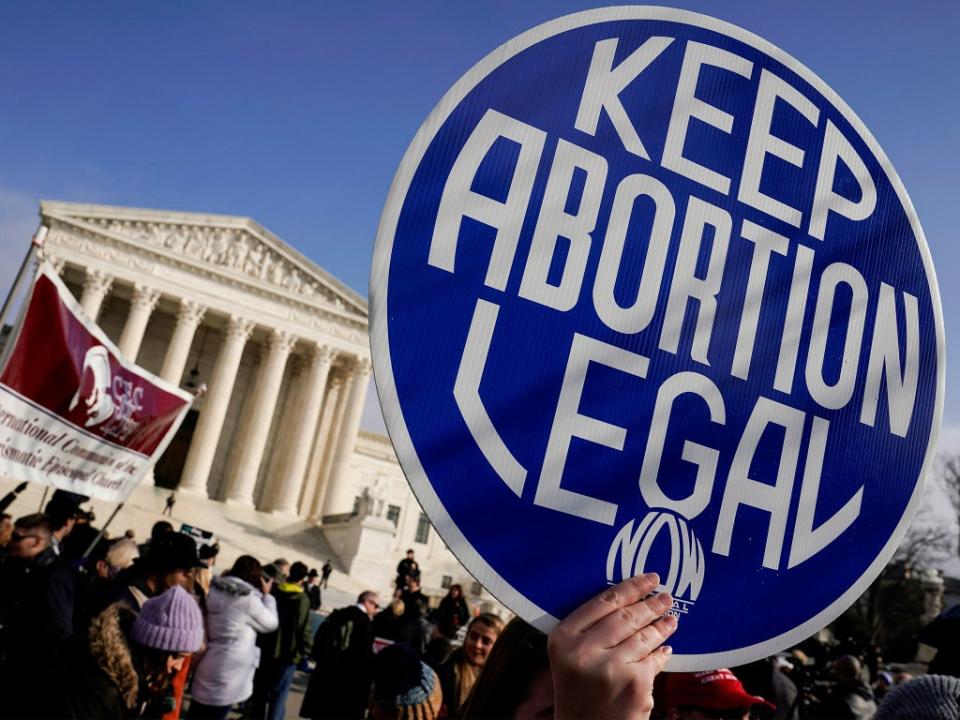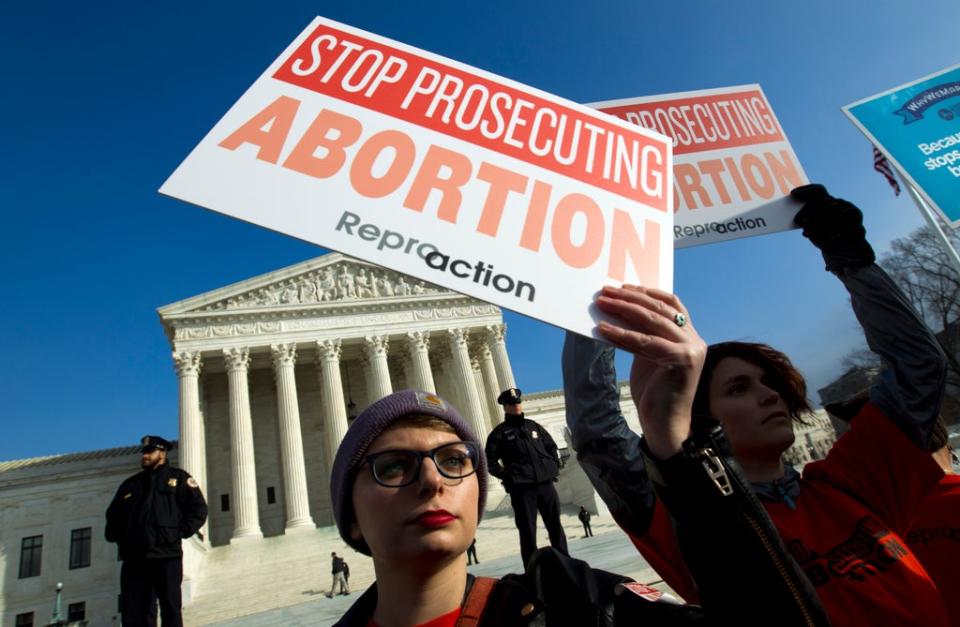Abortion Law: Which countries have the strictest laws and what are the punishments?
Louisiana has become the latest US to pass new legislation restricting abortion rights.
On Wednesday, a 79-23 vote saw the Louisiana House gave final passage to a bill barring abortion once there is a detectable foetal heartbeat, as early as the sixth week of pregnancy.
Georgia, Arkansas, Mississippi and Ohio have all passed similar so-called “heartbeat” bills this year, with Alabama passing legislation to ban nearly all abortions in nearly all circumstances, including rape and incest.
If the latter’s bill takes effect it will mean that those performing abortions would be committing a felony, punishable by up to 99 years in prison.
Several other states including Maryland, Minnesota, and Texas are also currently considering abortion restrictions.
Northern Ireland abortion protest in Westminster







Celebrities including Milla Jovovich and Jameela Jamil have taken to social media this week to voice their outrage over the recent slew of abortion bans across the US, with Lady Gaga describing Alabama’s abortion bill as a “travesty”.
Other's have pointed out that there are also several countries around the world with similar draconian and discriminatory laws restricting women's rights to a termination.
We’ve taken a look at the countries with the most restrictive abortion laws and the campaigns that are working to abolish them.
What’s the UK’s abortion law?
In England, Scotland, and Wales, the Abortion Act 1967 permits women to have an abortion up to 23 weeks and six days of pregnancy (gestation).
According to abortion provider Marie Stopes, there is no gestational limit for abortions if there’s evidence of a fatal foetal abnormality or a significant risk to a woman’s life if they continue with the pregnancy.
Abortions can only be carried out in an NHS hospital or a licensed clinic, and are usually available free of charge on the NHS. An abortion is legal if it is performed by a registered medical practitioner and that it is authorised by two doctors, according to the British Pregnancy Advisory Service.
The NHS states that there are three main ways to get an abortion on the NHS: contact an abortion provider; speaking to your GP and asking for a referral to an abortion service; and visit a contraception clinic family planning clinic; sexual health clinic or genitourinary medicine (GUM) clinic and asking for a referral to an abortion service.
You should not have to wait more than two weeks from your initial appointment to have an abortion.

The abortion procedure involves a discussion about the decision with a medical professional and the choice of two options of how a woman would like the abortion to be carried out.
A medical abortion, commonly referred to as the “abortion pill” involves taking two medications, usually 24 to 48 hours apart in the first 10 weeks of pregnancy.
The first pill, mifepristone, stops the hormone that allows the pregnancy to continue working. The second, misoprostol, is normally taken up to 48 hours later, and encourages the womb to contract to end the pregnancy.
Before August 2018, women in England were required to take the two pills at a clinic. However, campaigners said that the need for a second visit placed insurmountable barriers to healthcare for some vulnerable women and resulted in some miscarrying and bleeding heavily while on their journey home after taking the second pill.
England has joined Scotland and Wales who previously granted women the right to take early abortion pills at home.
Where is abortion banned with exceptions?
Some countries that restrict the procedure do permit terminations under certain circumstances which commonly include a threat to the mother’s life and in cases of rape or incest.
Poland
Under Poland’s abortion law, terminations are legal only in the cases of a threat to the mother’s life, if there is a foetal abnormality, or when a pregnancy has resulted from rape or incest.
In March 2018, thousands of pro-choice advocates took to the streets of Poland in “Black Friday” protests campaigning against plans to further tighten the abortion laws. Women's Strike group estimated that some 55,000 people attended protests in the capital.
In addition, over 200 nongovernmental organisations signed a public appeal to Polish lawmakers to reject the bill that they argued would "place women's health and lives at risk and violate Poland's international human rights obligations."
In 2016, lawmakers tried to impose a total ban on abortion, with the only exception being when a woman’s life was in danger. However, the plan was scrapped after thousands of people took to the streets in protest.
Northern Ireland
Northern Ireland remains the only country in the United Kingdom where abortion is still illegal.
Under laws dating back to the Offences against the Person Act 1861, it is currently illegal to have an abortion in the country and the maximum sentence is life imprisonment.
However, the majority of women seeking an abortion travel to England, Scotland or Wales.
In October 2017, former Women and Equalities minister Justine Greening said Northern Irish women would be able to apply for 'hardship' grants to travel to England where they will be eligible for free, fully funded abortions.
In recent years, there have been ongoing calls for a change in the law, increasing in volume after a referendum in the Republic of Ireland which overturned its ban the Eighth Amendment in May 2018. The amendment had previously prevented any further relaxation of the ban.
Ireland celebrates historic Yes vote on abortion referendum











In June 2018, a supreme court ruling in June indicated that Northern Ireland’s abortion laws were incompatible with human rights legislation. However, judges failed to issue a final ruling because the case that had been brought before them did not involve an individual victim.
At the time, Breedagh Hughes, the former Northern Ireland director of the Royal College of Midwives, said: “This is a start. It abolishes the myth that this is something that can be contained in Northern Ireland. There’s a moral obligation for Theresa May to bring forward legislation to ensure that women in Northern Ireland have access to their rights.”
You can donate to support the efforts of Belfast based charity Alliance for Choice which campaigns for abortion rights in Northern Ireland here. Alternatively, NowForNI which campaigns to decriminalise abortion across the UK invites pro-choice advocates to contact their local MP asking for their commitment to supporting urgent abortion reform in Northern Ireland. You can contact your MP directly with a messaged written by NowForNI here.
Andorra
Abortion is banned in Andorra except in cases where it is necessary to save the life of the pregnant woman. According to the law on abortion, a pregnant woman who performs an abortion or consents to an abortion could face a prison sentence of up to two and a-half years.
However, a person who performs an abortion with the consent of a pregnant woman is subject to imprisonment up to four years in prison and up to six if they are a physician, medical practitioner or health officer, or a person who customarily performs abortive practices.
An abortion performed without the consent of the woman is punishable by a maximum of 10 years’ imprisonment.
Stop Violencies is a group campaigning for the legalisation of terminations in Andorra. Find out more about their work here.
Liechtenstein
According to the Penal Code of 1987, women who have an abortion in the principality of Liechtenstein risk one year imprisonment, except in cases where the mother's life is in danger or she is under 14 at the time she got pregnant. Doctors who carry out an abortion can go to prison for three years.
In 2011, voters rejected a plan to legalise abortion in the first 12 weeks of pregnancy or if the child is severely disabled.
Opponents won the referendum with a majority of 514 votes, out of 11,510 ballots cast.
In response, political activists formed a citizens’ committee to revoke the prince’s right of veto. Under the Liechtenstein constitution, the committee had to gather 1,500 signatures by the to call a referendum.
A year later, Prince Alois of Liechtenstein threatened to step down from his royal duties if a citizens were successful in vetoing his power over maintaining the decriminalisation of abortion.
Which countries have a blanket ban on abortion?
Around the world there are total bans in places such as Haiti, Madagascar and Mauritania. Others include:
El Salvador
In 1998, El Salvador criminalised abortion in all circumstances.
In March, El Salvador’s Supreme Court freed three women who were imprisoned for 30 years after being accused of aborting their babies, despite they instead suffered miscarriages. Alba Rodríguez and María del Tránsito Orellana had both served nine years, while former prisoner Cinthia Rodríguez had served a 11 year prison sentence.
Amnesty International previously described El Salvador as "one of the most dangerous countries to be a woman".
You can sign a petition to call on President of the Assembly, Guillermo Gallegos, to decriminalise abortion in extreme cases here.
Malta
Malta is the only country in the EU where abortion remains illegal and prohibited in all circumstances.
Anyone found to perform an abortion (including a woman who performs one on herself or consents to someone else to perform the procedure) could face between 18 months and three years.
Meanwhile, a medical expert who performs an abortion faces a sentence of between 18 months to four years and a lifelong ban from their profession.

San Marino
San Marino imposes a total ban on abortion. In 2016, five bills (known as “Instances of Arengo” aiming to decriminalise abortion were put for a vote. The bills included one pressing the de-penalization of abortion in cases of grave danger to the woman, another wanted to permit abortions for women who became pregnant by an act of violence, and another would allow in cases where there are strong indicators of a malformed foetus.
Philippines
Abortion was criminalized through the Penal Code of 1870 under Spanish colonial rule and incorporated into the Revised Penal Code passed in 1930 under U.S. occupation of the Philippines.
The criminal provisions on abortion in the Philippines do not contain any exceptions allowing abortion, regardless if the life of the pregnant woman is at risk.
Physicians and midwives who perform abortions in the Philippines with the consent of a pregnant woman may face up to six years in prison under the Revised Penal Code.
Women who undergo abortion for any reason may be punished by imprisonment for two to six years.

 Yahoo News
Yahoo News 
